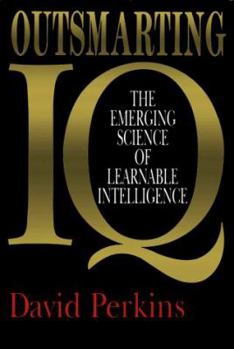Outsmarting IQ: The Emerging Science of Learnable Intelligence
Select Format
Select Condition 
Book Overview
Arguing that intelligence is learnable and not genetically fixed, the author identifies the three distinct types of intelligence and describes how intellectual skills can be developed. This description may be from another edition of this product.
Format:Hardcover
Language:English
ISBN:0029252121
ISBN13:9780029252123
Release Date:March 1995
Publisher:Free Press
Length:390 Pages
Weight:1.52 lbs.
Dimensions:1.2" x 6.5" x 9.6"
Customer Reviews
4 ratings
Pleased with this books information.
Published by Thriftbooks.com User , 16 years ago
This book gave me a greater insight into the emergence of developing thought and reflection to gain intelligence.
Great book presenting a theory of learnable intelligence
Published by Thriftbooks.com User , 23 years ago
What is the nature of intelligence? How and to what extent can intelligence be developed? What aspects of intelligence can de identified and what aspects especially demand attention? While the classic view of intelligence implies that intelligence is a fixed, genetically determined characteristic of individuals this book presents a different perspective: a theory of learnable intelligence clarifying to what extent and how our intelligence can be amplified. Three dimensions of intelligence are identified: 1) neural intelligence: neurological speed and precision; in large part genetically determined, 2) experiential intelligence: extensive common knowledge and skill and specialized knowledge and skill; learned, 3) reflective intelligence: strategies for memory, problem solving, mental self-monitoring, meta-cognition; learned. Perkins argues that reflective intelligence offers the best opportunity for improving intelligent thought and behavior. Perkins identifies important pitfalls in human thinking and reasoning and shows how to avoid them. The author acknowledges that intellectual talent is a real phenomenon and does not deny any intellectual differences in intellectual talent. He argues that most people can learn to use whatever intellectual talents they have much better than they normally do. This book, which reminds of the work of Robert Sternberg, is a true must for anyone interested in theories of intelligence.
Smart Start
Published by Thriftbooks.com User , 23 years ago
I own this book and it's a smart start to learning about intelligence. P.S. The boy from the Phillipines has a good assessment of this book. As to the reviewer who said he needed to go to college before he spoke or wrote--well at least HE can spell and type!
Every intelligent person must read this book
Published by Thriftbooks.com User , 25 years ago
I really didn't expect this book to be this book. I was kind of expecting a book that would increase my intelligence. However, I found myself stumbling into an area that has been for years my interest, but not my field of pursuit. I'm just a high school student (1999) and I believe that this book opened to me a portal to a subject that is uncommon yet inherent in all human beings. This book gives a history of the many theories and proposals of intelligence and arranges and analyzes them into a conglomeration of understandable concepts weaved together. If you want to know everything (well, almost) about intelligence, how it works, and why researchers have different views on it, and why there is an argument of whether intelligence can be learned, this is a perfect book for you to be introduced, and be well-informed about the intricacies of human reasoning and processing. This book is quite long though, you have to read about 340 pages of almost pure text, which at times can be a bore. But who said this was for entertainment anyway? Reading this book is not a joke; it can't be. I gave this book a five not just because the writer is from Harvard but because his reasoning is Harvard. The author introduced me to a world of mystery (with psychological bases of course) and has, in a matter of speaking, made me an "intelligent" addict. It is to my sincere thinking that people who will read this book will never be the same again.





